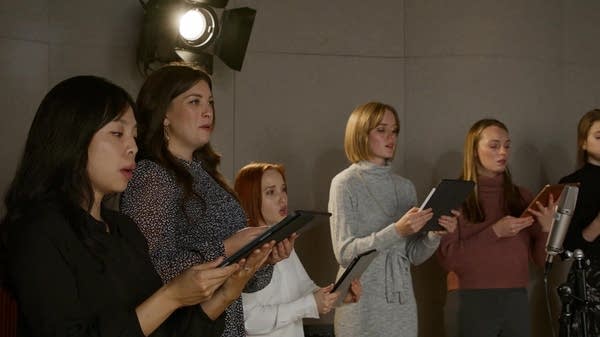I've been thinking about the differences and divisions between vocalists and instrumentalists. This was prompted by a cast member from Cats, where I was playing in the pit, introducing herself backstage and asking my name. It was surprising to be asked, and then the fact that I was surprised was itself striking.
In my experience, instrumentalists tend to stick together, whether it's chatting before rehearsals or going out after a concert, and the same goes for vocalists. Like with like is just human nature, and the physical distance between stage and pit often acts as a barrier between the two groups. While vocalists and instrumentalists take some of the same courses in school, many of the courses are different, which has some effect on how personal relationships are formed. For these reasons, though we're all musicians and do have a lot in common, sometimes our two spheres seem far apart.
The vocalist/instrumentalist division isn't necessarily a huge problem for classical musicians, but it's a shame when it leads to missed opportunities to learn from each other. Instrumentalists can learn a great deal from observing and talking to singers, and vice versa. I'll address the former here, and the latter in a companion article.
Phrasing and expressiveness are probably the most important things instrumentalists should observe and try to imitate—or, if they're ambitious, emulate—in vocalists. Instrumentalists can get bound up in the technical aspects of playing like fingerings and bowings—or just producing the notes on the page with the complex contraption at hand, as beginning horn players all discover. Technique is essential, but it's a means to an end. Without attention to phrasing—rise and fall, going somewhere and coming away—musicians can't be very musical. Not every singer is a model of musical phrasing and persuasive expression, but it does seem to come more easily to singers than to those who play instruments.
Breath support and the related issue of sustaining sound are also valuable lessons from the vocal world. Again, an instrument sometimes obscures the significance of fundamentals like a deep breath and good sound sustained through the length of a note or phrase. This is true for strings as well as winds and brass. Some of the string faculty at the festival here informed me that breathing before a piece begins is crucial for producing the best sound. Yesterday in our opera orchestra rehearsal, the maestro told the violins, "Every inch of the bow should be singing, singing, singing. Always." Many instrument teachers, in fact, advise their students to "sing" when they're playing. I write the word in the margins of my Mozart horn concertos to remind myself that in addition to precise rhythm and intonation, I need to take deep breaths and sustain a beautiful sound throughout the entire piece.
I also learned from the string faculty that string players borrow from the vocal world by using metaphors of syllables and consonants. One violinist said that to avoid mushy playing with a long run of notes, he plays as though there is one syllable for every note. Another violinist talked about the initial bowing of a note as the initial consonant of a word: it must have a clear beginning.
Finally, vocalists are excellent studies in stage presence. It's a stereotype that's certainly not true in every case, but vocalists do tend to seem more comfortable in the spotlight, and have more dramatic personalities than instrumentalists. Whether you're singing or playing for an audience, every gesture contributes to the whole effect of the performance, and every facial expression matters.
It's not necessary for instrumentalists to add gratuitous looks and gestures when they perform, but they should be aware that what comes out of the instrument is not the only thing that counts. This is true for strictly instrumental works, but it also applies to playing with vocalists. Cellist Sally Dorer of the Minnesota Opera Orchestra told me a story about a solo passage she played in the opera Silent Night. The solo was somewhat treacherous, and the performance was going to be recorded for television. What helped ease her anxieties was thinking of her cello solo as part of the drama of the scene, which involved a soldier burying another soldier. As Sally explained, "I realized the moment was larger than what I was doing with it."
Gwendolyn Hoberg is an editor, writer, and classical musician. She lives in Moorhead, plays with the Duluth Superior Symphony Orchestra, and writes the Little Mouse fitness blog. She is also a co-author of The Walk Across North Dakota.
Love the music?
Show your support by making a gift to YourClassical.
Each day, we’re here for you with thoughtful streams that set the tone for your day – not to mention the stories and programs that inspire you to new discovery and help you explore the music you love.
YourClassical is available for free, because we are listener-supported public media. Take a moment to make your gift today.











